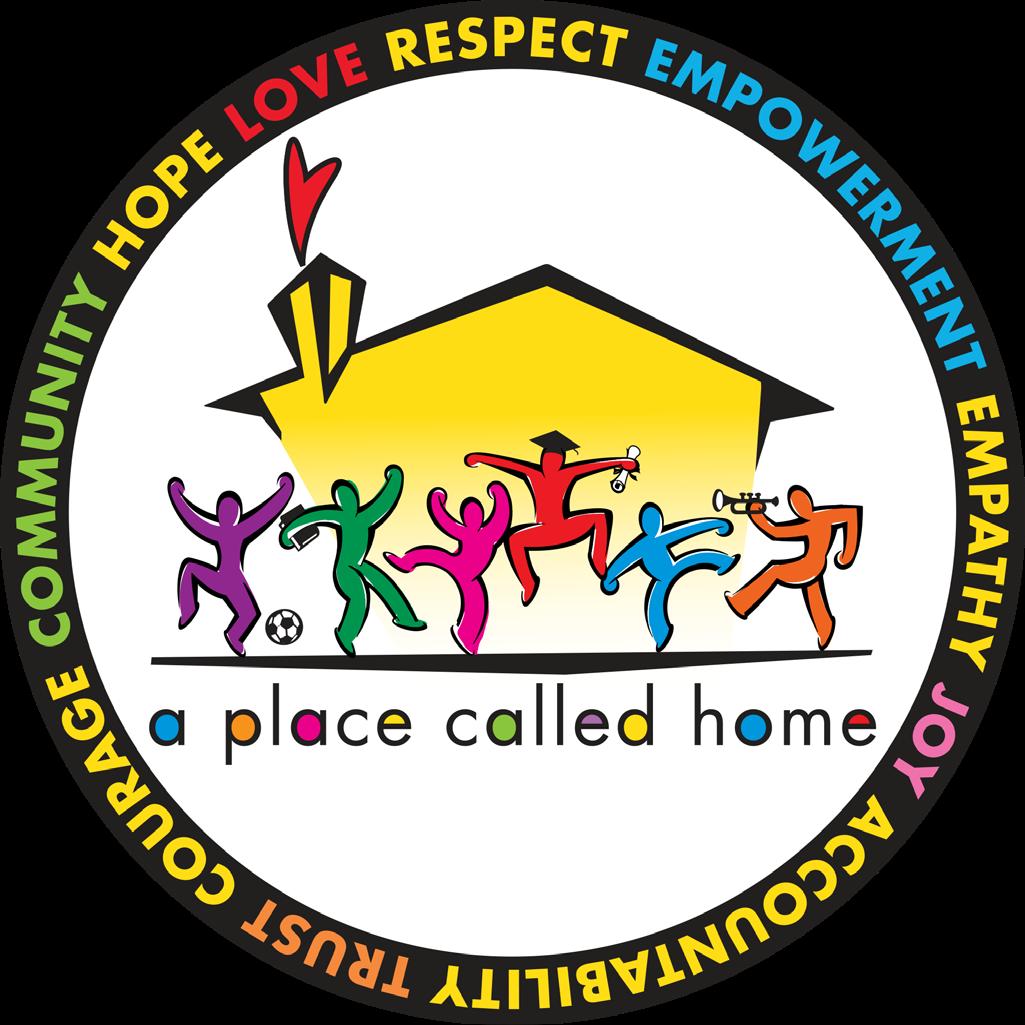




Dear APCH Community,
I am excited to be sharing my first newsletter message with you. First, I want to say thank you for such a warm welcome to A Place Called Home. The sincere kindness I’ve felt in con necting with many of you has only further af firmed my decision to step into the role of CEO.
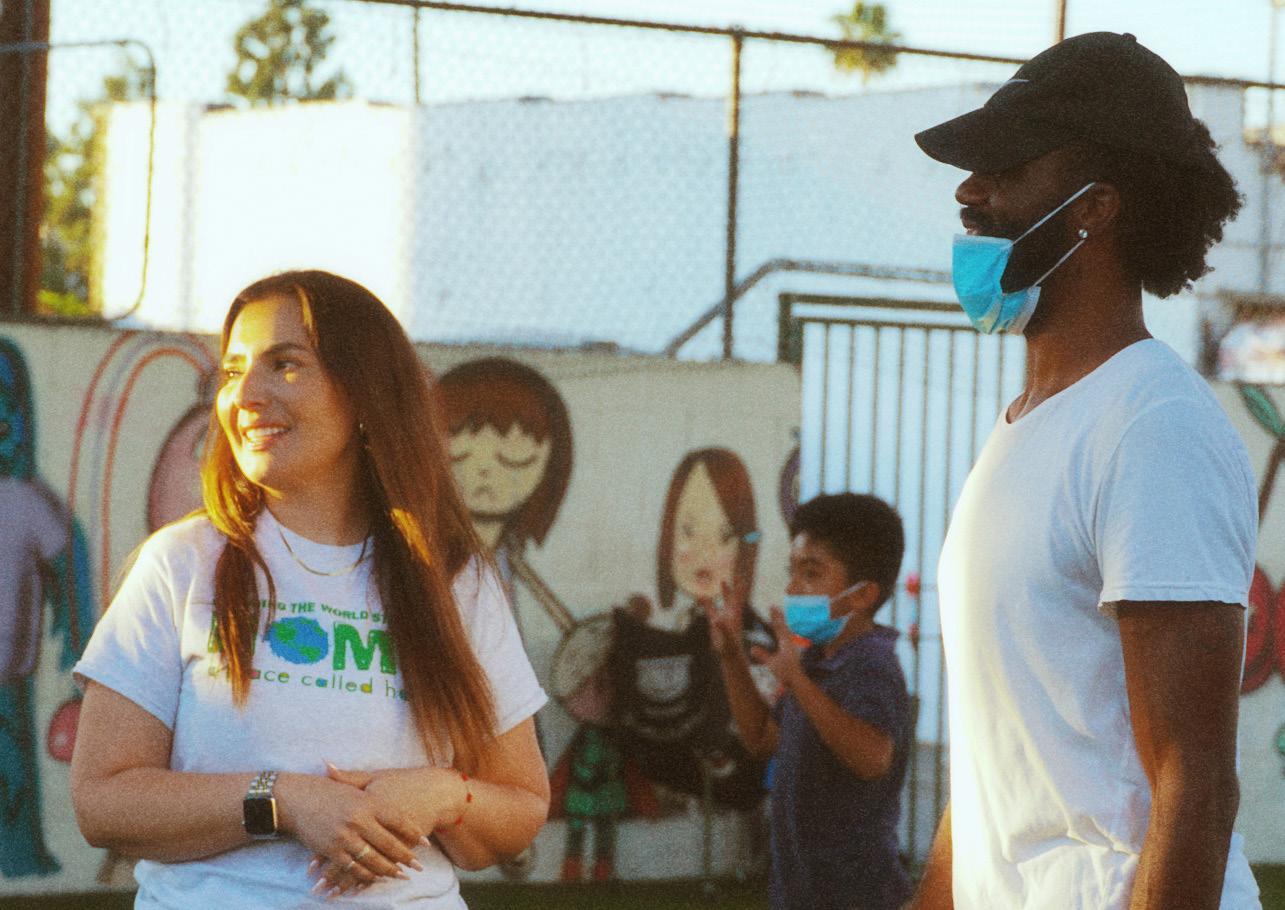
When I decided to come onboard, I was asked
“Why APCH? What made you say yes?” And the answer is: my story is very similar to those of our youth members. In high school, I had my whole life planned out, but plans changed when I became a teen mom right after gradua tion. I thought “What am I going to do now?” It was then that my parents stepped in and said “We will help you. Go to college, stay focused,” and I know that had it not been for that sup port system, I wouldn’t be here with you today.
That’s why I said yes to A Place Called Home. I had a community of people behind me, helping me achieve my dreams and get to where I am today, and that is what APCH is for our young people. This community de serves the opportunity to dream, too, and to be able to fulfill those dreams. I have wit nessed firsthand the deep commitment of our staff, donors, volunteers, and supporters
to serving the young people at APCH, and it’s that commitment that will drive us forward to continue changing lives.
As we enter A Place Called Home’s 30th year of service to our South Central community, we are moving forward with renewed energy and passion, and I have a few exciting updates to share with you. In 2021 we began working with a consulting firm to gather and share stories of transformation, and the evolution of APCH. This year, building off of that work, we launched the APCH Evaluation project, through which we are assessing the opera tions and impact of our programming to im prove efficiency and to ensure we are provid ing the best possible programs and services to our members, families, and community.
We have also begun work on our Technol ogy Transformation, the initiative started by Jonathan Zeichner, that will bridge the digital divide for our members and fami lies – giving them access to state-of-the-art hardware and software and making APCH a community resource for technology.

All of our member technology is now man aged by our in-house Programs Technolo gy Department, allowing us to pivot faster, troubleshoot, and address issues in real time. And, our Programs Technology and Member ship Departments have partnered up and, in 2023, will begin offering technology class es for parents, and will provide participating families with refurbished home computers. In addition, we have upgraded the Wifi on both of our campuses to increase our capacity and ensure that our members and staff have access to high speed, high quality internet.

On behalf of all of us at A Place Called Home, I want to extend sincere thanks to
all those who donated to our Bridge to the Future Fund in support of this Technolo gy Transformation. This initiative will en sure that our members can participate ful ly in our 21st century world and workplace.
There are great things ahead for A Place Called Home and I am honored to embark on this journey with you as a partner and leader. I look forward to all that we will accomplish together. .
A Place Called Home
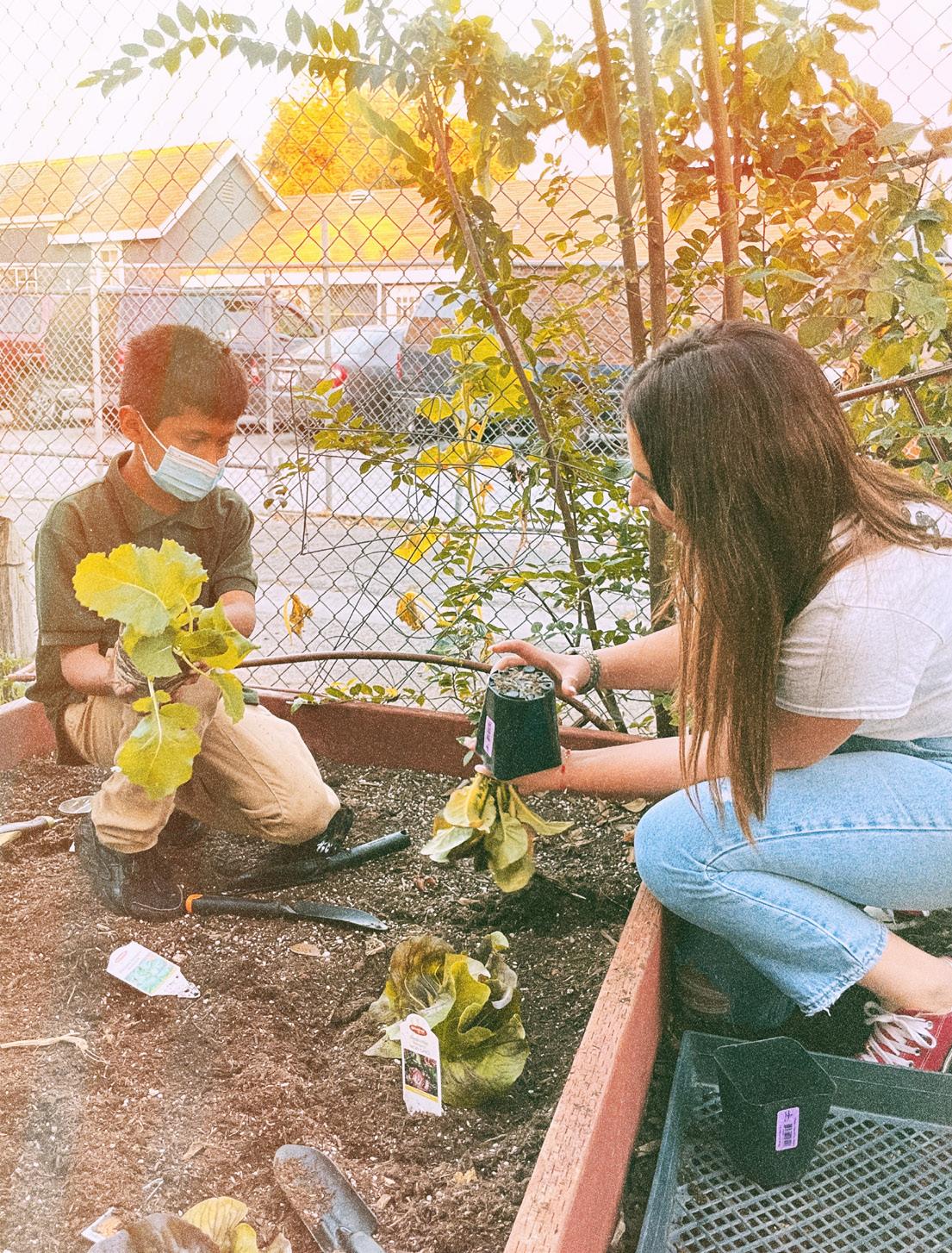
It was the late 1990s and a friend of Cin tia Hernandez’s stated he didn’t believe women could — or should — be working in formally male-dominated careers — including the Los Angeles Police Depart ment. Even though Hernandez wasn’t entirely sure she wanted to join the LAPD after graduating from California State University at Northridge — she bet the friend $100 that she would get accepted. “I won the bet and got my career,” she said.
Betting on herself wasn’t new to Hernan dez. She grew up in South Los Angeles, attended Ascot Avenue Elementary, Dr. George Washington Carver Middle School and Jefferson High School. Determined to stay away from the gangs and drugs that were rampant in her neighborhood, she asked her mom to sign her up at A Place Called Home after hearing about the organization from a friend. “I re membered I walked in and learned about a whole bunch of different activities they had, and I said, ‘Wow, this is so cool,’” she said. “It was a safe haven for a bunch of us who just needed a place to go and hang out and do things that interested us.”
Hernandez took advantage of everything
By: Mira ZimetAPCH offered, which included classes on leadership skills, resume building and cover letter writing classes; but what stuck with her throughout her years was their mentoring program, Youth Mento ring Connection. Hernandez’ first men tor was Cristi Catlin, then an executive at HBO. Catlin, along with other mentors from HBO would bring some of the mem bers to their HBO offices — and expose them to parts of the city they hadn’t had a chance to explore. “I hadn’t even seen the ocean or the beach,” she said. “My parents worked so many hours we didn’t have a chance to do those kinds of things.”

Catlin and another former mentor, Youth Mentoring Connection CEO Tony LoRe have stayed in her life ever since. “Way over half of my life they’ve known me, and they’ve been instrumental in everything I’ve done and who I’ve become,” she said. “They were the leaders, and my role mod els. You never forget people like them.”
This life-long relationship with her men tors inspired Hernandez to pay it forward. She joined the Los Angeles Police De partment in 2008 and has worked many specialized units and details. In 2016 Her
nandez was transferred back to the com munity she grew up in and assigned to the Community Safety Partnership Bu reau within the Newton Area. “We do safe passage, making sure the kids in our area are safe to and from school,” she said. “We do youth wrap-around programming; we have Boy Scouts, Girl Scouts, leader ship programs, softball, baseball team, t-ball, football, bike programs, boxing and much more. Our mission is to make sure that the quality of life improves for all community members in our area.”
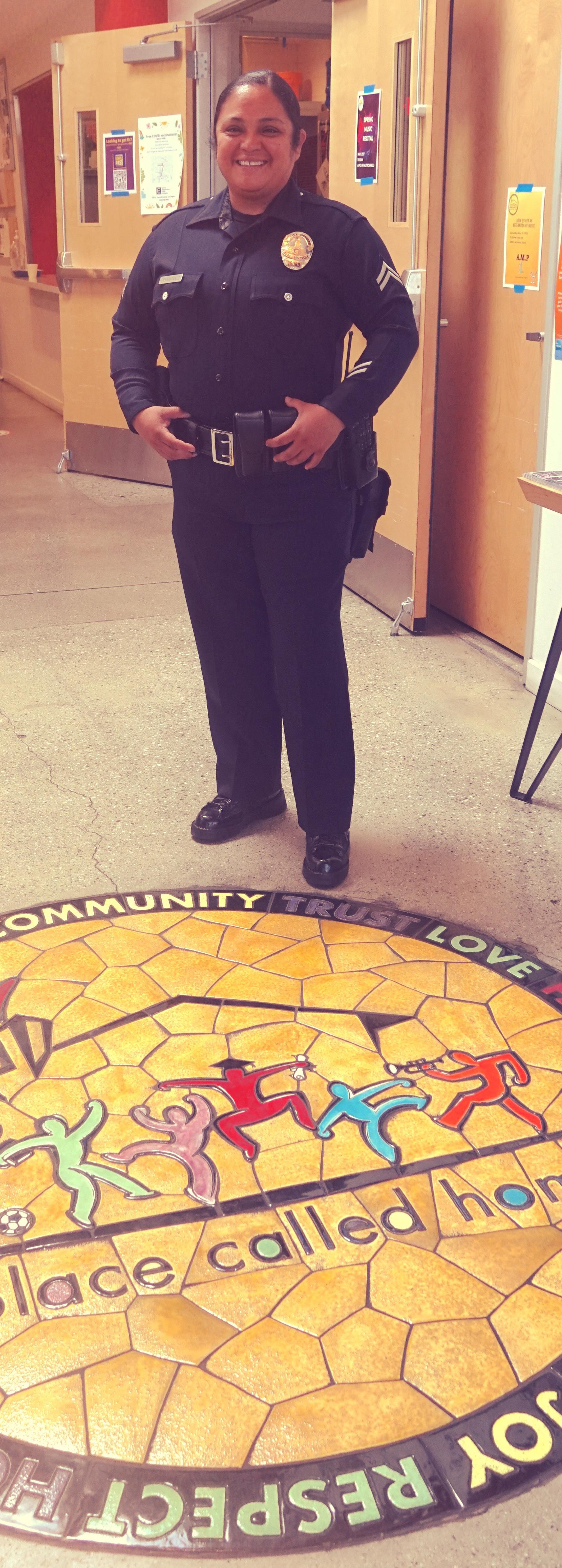
In the leadership programs Hernandez urges youth to write out goals and stick with them. “I want to make sure kids don’t have to go through what we went through,” she said. “To me, if we could plant seeds and help, I’m all about it.”
There is a quote from Mother Teresa that has stuck with her, “I alone cannot change the world, but I can cast a stone across the water to create many rip ples.” It has helped in mentoring many youths throughout her career as well.

“I alone cannot change the world, but I can cast a stone across the water to create many ripples.”
As pandemic enforced social distancing comes to a close, one thing is certain: The opposite of being socially distanced is the community gathering inherent in theater, so said Efrain Schunior, Theater Program Man ager at A Place Called Home. “We’ve been isolated for so long it doesn’t surprise me that the kids would — like protons and electrons — want to congregate together,” he said.
When members returned in person to APCH this past spring, they had the chance to get hands-on experience setting up and run ning the second annual El Centro Del Sur Latiné Theater festival that ran in late September. “It’s the first of its kind,” Schunior said. “A theater festival for South Central, bringing quality Lat iné theater to our community.”
The festival, originally funded by a National Endowment of the Arts grant secured by APCH, was de signed to give members experi ence producing an event. During the three-day run in late Septem ber, teens were responsible for staffing the box office, ushering guests to their seats and running the light and sound boards for each of the shows. Schunior adds that for next year’s festival, their roles will expand and they will be responsible for producing all aspects of the event alongside Theater Program staff.
Getting students involved in theater

was a hard sell in the beginning. “It’s atypical to let your light shine in South Central and let yourself take center stage, you know?” Schunior said. But he, along with Daniela Naran jo, the Theater Program Coordinator, stayed consistent both prior and during the pandemic, and members started to join.
“Being POC [people of color] it takes a cer tain amount of vulnerability — specifi cally in the Latiné community — to see how following your passion into the arts is something that can be successful,” Naran jo said. “But Efrain and I have a strong passion and perspective to change those views. We are here to tell our community that you can dream of a career in the arts.”
When the Fall semester started this past Au gust, the Theater Program went from a full day summer camp to an afterschool program, and older teens members began rehearsals for “She Kills Monsters,” a play by Qui Nguyen.

“The students quickly became an en semble,’” Naranjo said. “You can really see where they lift each other up.” Schunior added, “Theater is a great learning tool to teach them to show up, be account able, do your part. In theater everyone has a unique role to play and everyone fits in.”
Schunior and Naranjo also run classes for ele mentary and middle school aged members. “We call them the ‘littles and the middles,’”
Naranjo said.
“I usually start the day by giving them tongue twisters and impro visation games. I like to get them out of their head and into their body. Into the practice of being curious, which is what theater is about.”
While APCH doesn’t stage plays for the younger groups (yet), they have oppor tunities to make their own props and masks, act out different types of charac ters and put on short play presentations. “The goal is to start a pipeline for elemen tary and middle school students into the teen advanced classes,” Naranjo said.
Like most departments at APCH, there is collaboration within the organization and also with a variety of outside part nerships. The Latino Theater Compa ny, Company of Angels, A Noise With in and East Los Angeles College have all supported the program and the youth.
“Our goal with the program is to create a pathway for them towards college — if that’s what they choose.” Schunior said. “With the idea of theater as a career option.”
- M.Z.If you’ve ever taken a tour of A Place Called Home or attended one of the organiza tion’s many events, chances are good that you’ve received an APCH album as swag, nestled in a box of art cards (and if you ha ven’t, we have one with your name on it!). What began as a special gift for event guests and campus visitors, has become a sym bol of growth, both musical and emotional, for members of the APCH Music Program.
A Place Called Home’s Music Program offers more than 20 classes that span a wide variety of disciplines and skill levels. Guitar, ukulele, and piano top the charts as the most popu lar instrumental classes. There’s also The Re cord Shop – a music appreciation class, World Rhythms, and The Musicians Guide to Music as a Career, to name a few other offerings, but it’s the Advanced
By: Maggie StillmanRecording Class that produces the highly anticipated annual album.
“The creation of the APCH album is really a year-long process,” shared Joaquin Pacheco, Music Program Sr. Manager/Studio Engineer.
“Members start in the spring learning funda mental skills such as hooking up the cables and using microphones. We also explore the different roles that are part of the process of creating an album, from the engineer and the songwriter, to the singers and musicians.
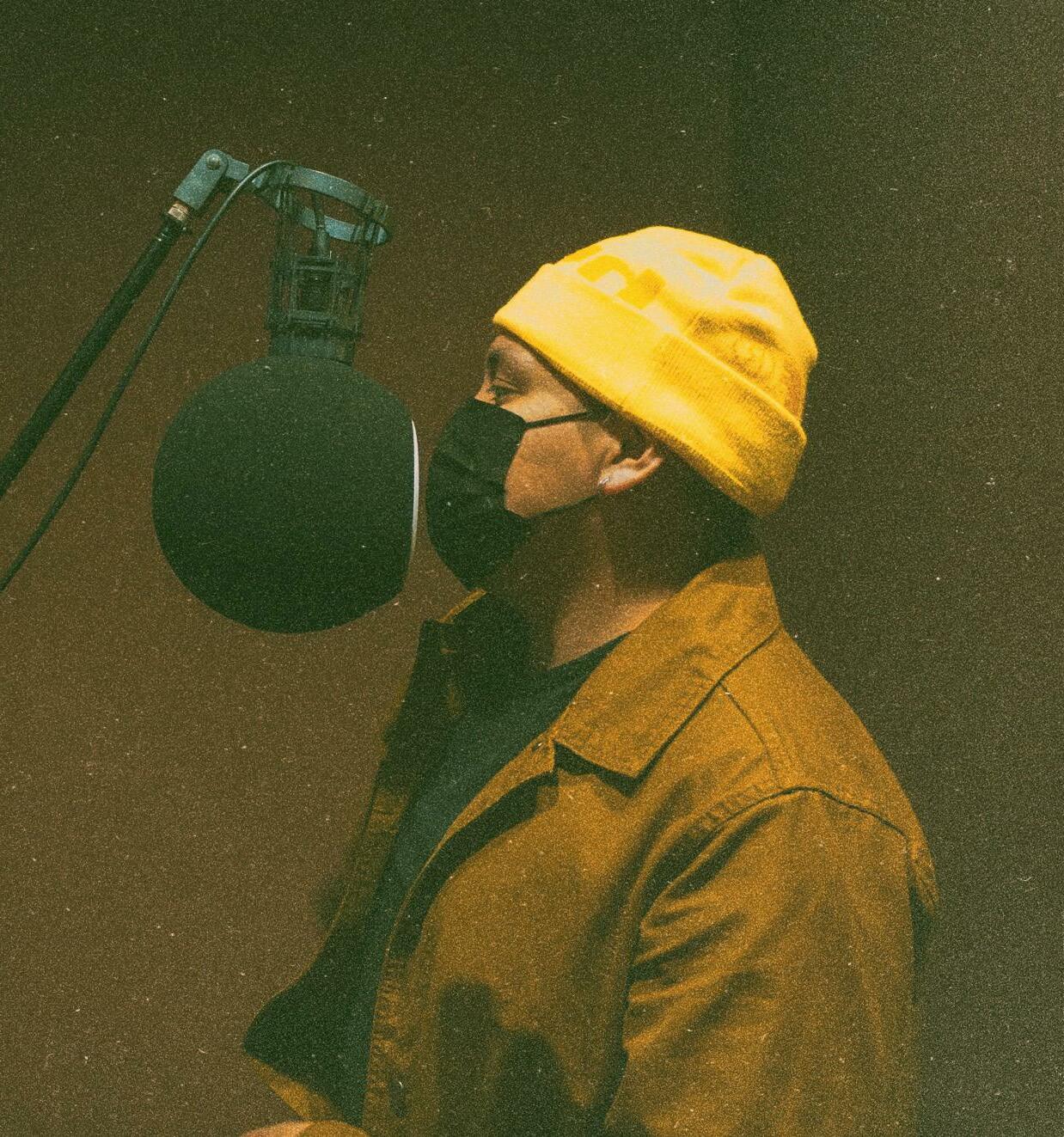
Throughout the summer and fall semesters, the musicians get to work in their roles, re cording and refining content for the album and working together to set the final track list This year’s album features a selection of original, member-written songs and spoken word pieces, along with a few covers, includ ing a class favorite “That Thing You Do” from the Tom Hanks movie of the same name.
The goal of the Music Program is to give members real world music industry experi ence. “We want our members to see what the professionals go through,” said Pacheco. “The class is an immersive experience and APCH is the vessel that allows our mem bers the financial support and struc ture to explore music as a career path.”
At the end of the year, when the al bum is complete–members of the Advanced Recording Class receive a physical copy–a tangible repre sentation of their hard work. “It’s not just about vocational training, it’s also about community build ing,” shared Pacheco. “It’s amazing to see our members grow not only musically, but socially and emotion ally throughout the whole process.”
Water flew in all directions as members of A Place Called Home’s Pre-Dance Compa ny choreographed a new piece in a courtyard fountain at the Wende Museum in Culver City. This was just one of a few site-specific dance workshops they participated in this sum mer with the professionals at Heidi Duckler Dance (HDD), a longtime partner of APCH.
Other workshops included a trip to the Bendix Building rooftop where the dancers let the Downtown Los Angeles skyline inspire their choreography, and a culminating performance on the APCH basketball court during which the members created a new modern piece, dancing in and around a yellow Mustang convertible aptly named the “Dance Mobile.”
According to Jocelyn Garcia, APCH’s Dance Program Manager, the main goal of this summer intensive workshop was exposure. “I really wanted to push our members out of their comfort zone to explore different types of dance and create movement in a way they haven’t before,” shared Garcia. “I wanted them to see what the dance world has to offer beyond the studio.”
Aside from specific workshops, APCH’s Dance Program offers an array of classes includ ing ballet, hip-hop, and world of dance which are open to all members. “We have some thing for everyone,” said Garcia. “My intention is to foster a safe environment for all of our young people to dance and have fun. And for the members who are interested in pursuing a career in dance, they are able to join our middle school group Pre-Dance Company, or our high school group, Dance Company, that really offer them a conservatory experience.”
At APCH, Dance is both about learning the technique of the craft, but also about the social and emotional growth that happens in the process. Not only are members working on choreography, but they’re also learning life, leadership, and communication skills, and ultimately how to express them selves in an impactful and healthy way.
“Dance is art. It’s healing. It’s a safe space to release your emotions and be pres ent in the moment,” Garcia said. “It’s so re warding to see our members come into class and just let go and dance. The room comes alive and it’s amazing to witness that.”
-M.S.A Place Called Home Pre-Dance Company members dance atop the Bendix Building rooftop in Down town Los Angeles. Inspired by the city skyline and their red umbrellas, the dancers exper iment with movement and work together to choreograph a new piece.
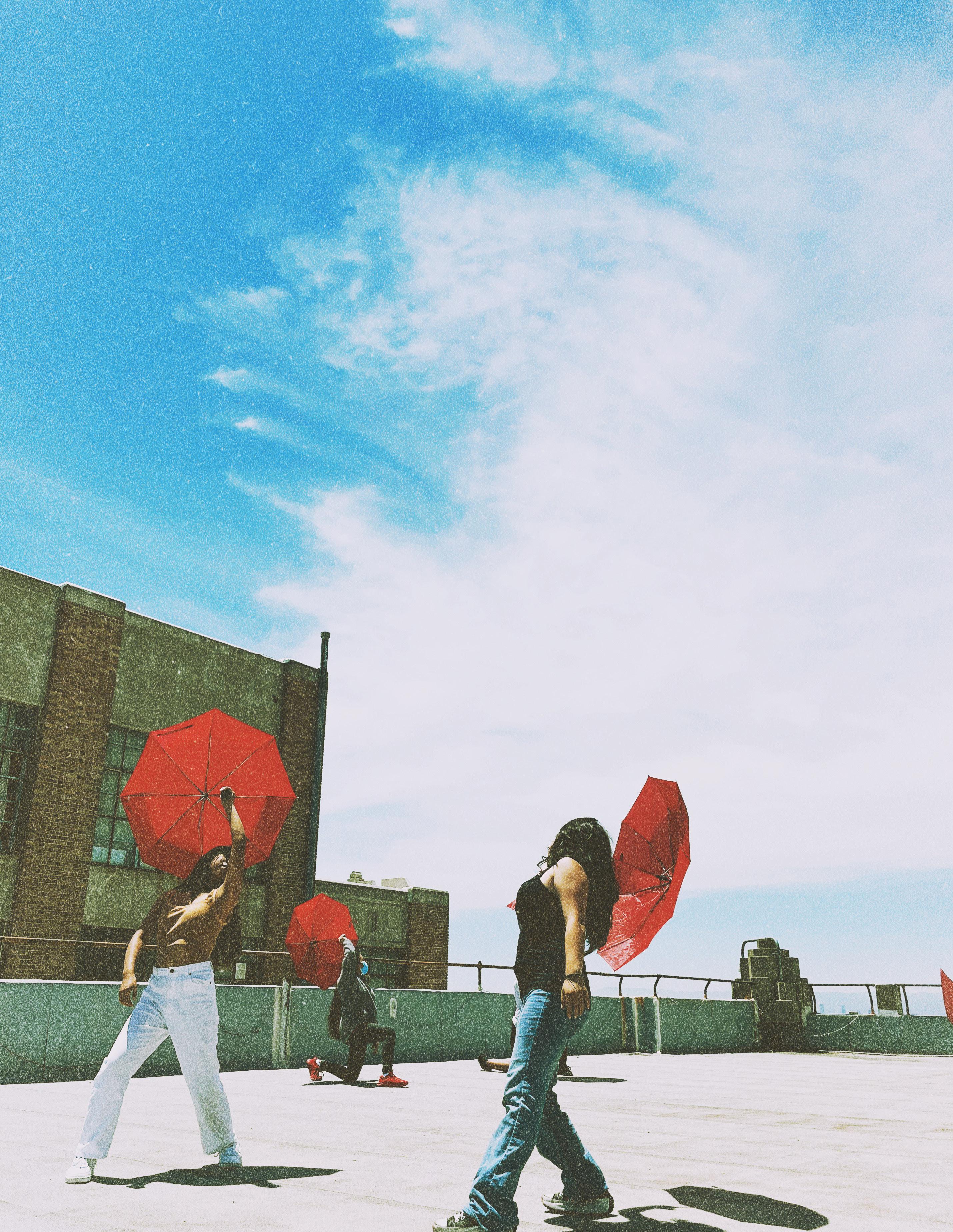



Take a peek into the APCH Reading Room on a Friday afternoon, and you might just catch the formulation of slime, the construction of a desert terrarium, or the creation of new elements (imaginary, that is!). The Educa tional Services department’s Science Explo ration Class gives elementary and middle school members the opportunity to learn through tons of creative, hands-on activities.
As one of many class offerings from the Ed Services Department, Science Explora tion is focused not only on academics, but also on encouraging curiosity and connec tion between members, their peers, and the world around them. “I want to inspire our members to have open minds, to ask questions, and most of all, to love learn ing,” shared Alethea Redclay, Education al Services Program Coordinator of Math and Science. “I try to bring a smile to their face, while also giving them real world ap plications for the concepts we’re exploring.”
Redclay and Educational Services Academic Assistant, Karla Burciaga, are continuously curating fun projects to get mem bers excited about science, and the Ed Services Department often col laborates with other departments and outside partners to enhance classes even further. This semester, members can look forward to explor ing body systems with staff from the APCH Athletics department, and learning about fossils from docents at the Natural History Museum who plan to make a special visit to APCH!
The goal of the class is to encourage mem bers to be inquisitive both inside and outside of the classroom. “We’ve seen their interests expand and many are even asking for tips on do ing science experiments at home,” shared Karla Burciaga, Ed ucational Ser vices Academic Assistant. “They’re connecting with each other and com ing up with their own questions and ideas, and that’s a pow erful thing to watch,” Redclay added. The best part is, they don’t even realize they’re learning, to them, it’s just fun!” -M.S.

Nearly 250 hours of academic support and tutoring provided this year in addition to regular educational services programming.
A small basketball hoop hangs from the back of Daniel Cendejaz’s door, and a small basketball sits on his desk. Cendejaz is the Educational Services Program Coordinator of English and Language Arts and, while not an athletics class, he uses these sports tools, among others, to get his mem bers excited about language learning.


The Educational Services Depart ment’s Language Focus Class is for members who need extra help developing their reading and writing skills, specifical ly those who are having diffi culty in school. Throughout the APCH class, members work on concepts that include word blend ing, fluency, and reading comprehen sion, all while having fun along the way.
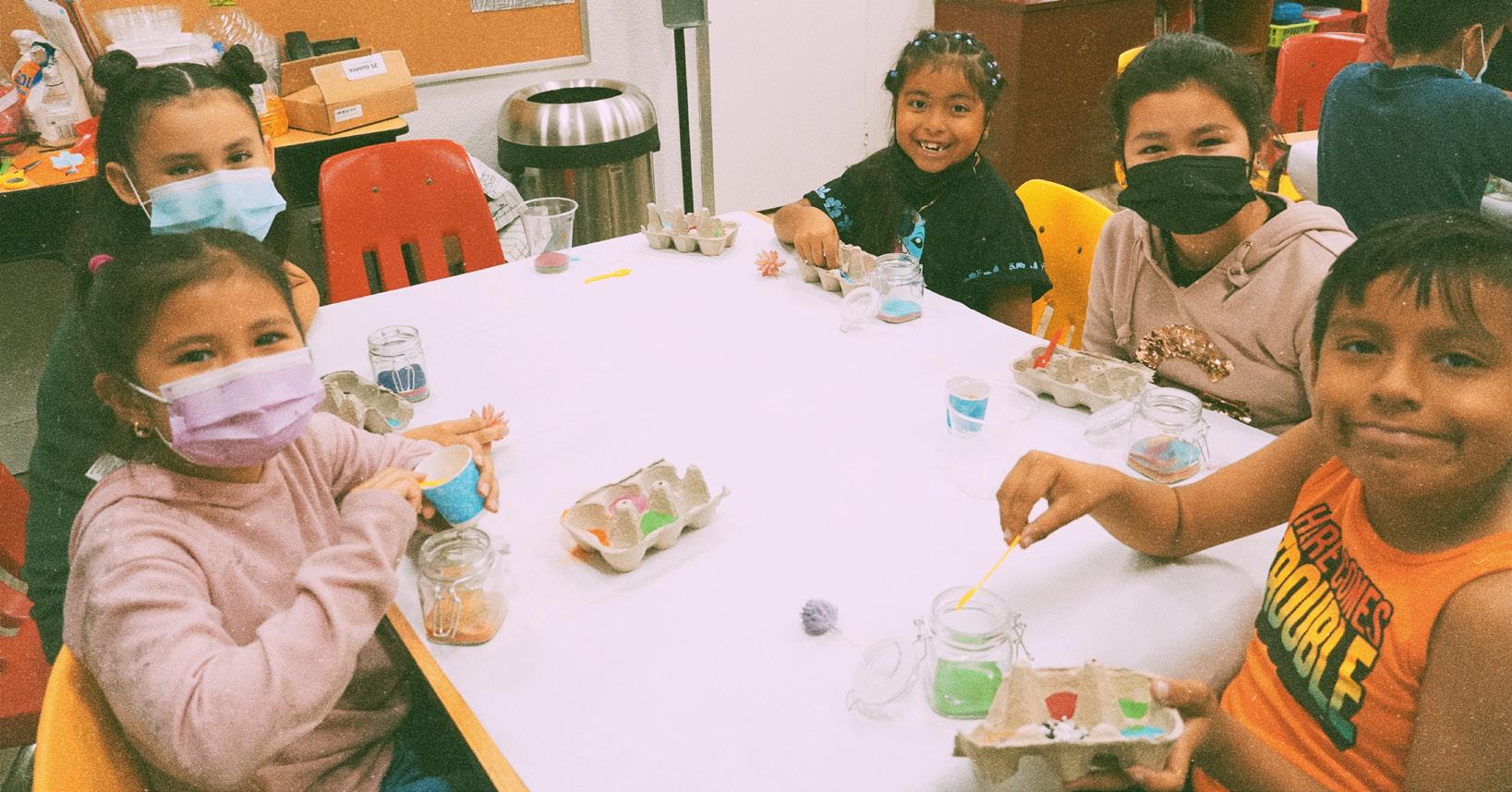



“I try to incorporate games into my teach ing,” shares Cendejaz. “If I have a question up on the board and a member gets it right, they get to shoot the basketball into the hoop, and they really love that. It gets them excited for the next question.” Members also choose books on topics that inter est them, which in turn motivates them to learn. Science and his tory are popular choices. Cendejaz also combines his creative writing exper
tise and love of history to compose his own short stories for members to use in class.
In addition to the classwork — and the fun and games — Cendejaz, along with APCH’s entire Educational Services Department, keep a close eye on members’ progress through regular skills assessments. Staff members also track report cards to ensure they are aligning lessons with areas in which members need support. The program is de signed to meet young people where they are, and to stick with them as they build their skills throughout their time at APCH.
Ultimately the goal of Language Focus is to support the young people of APCH in becoming confident and competent indi viduals. “My intention is to help our mem bers improve their fundamental skills, but I really want to instill in them a sense of resiliency, too, Cendejaz shares. “I’m big on sports metaphors, so I always say ‘You don’t always have to win the game, you just have to make an effort.’ As long as you’re trying, that’s what matters.” -M.S.
What was once an inconspicuous red brick wall at A Place Called Home’s Bridge Cam pus, has now been transformed into the dwelling for an expansive vertical garden–home to lettuce, chives, and more–from which community passersby are welcome to harvest the fresh produce for their own use.

This initiative, a collaboration between APCH staff and volunteers, the Los Angeles Rams, and NFL Green–produced not only the one vertical garden, but also a second one on APCH’s Main Campus. “The goal of the proj ect was to create more visibility for the Ur ban Agriculture Program, one of the programs offered at APCH, and to really interact with our community members,” shared Andre Jackson, Urban Agriculture Program Manag er. “We want community members to take ownership of the plants, to feel like they are theirs to utilize, be cause they are, they are all of ours.”
The Urban Agriculture Program at A Place Called Home seeks to build a curiosity within its youth members, evidenced by the new addition to the class roster: Plant Science. Un like the more traditional agricultural class offerings where members are focused on planting and harvest ing in the garden, Plant Science is experiment based. Members in this class devise new approaches, includ ing planting seeds inside soil-filled water bottles and stashing them in different locations, and propa gating seeds on wet paper towels.


“We’re not just growing plants, we’re exploring the whole process – asking ‘Why did this work bet ter than that?’ ‘What can we do differently next time?’” said Jack son. “The experiments give mem bers the opportunity to test their

In South L.A. (SPA 6), about half of all census tracts are food deserts.* APCH has provided nearly 85,000 healthy meals to member families since July 1, 2021
own ideas and come to their own conclu sions. Allowing them to do the discover ing on their own really makes an impact.”



Through Plant Science, APCH’s young peo ple develop a better understanding of the origins of their food and the benefits of incorporating nutritious ingredients into their diets. In South Central, families of ten have very limited access to fresh pro duce, while fast food restaurants abound. But, with the addition of the gardens on campus, as well as two others at the New ton Police Station and St. Patrick’s Church that the organization maintains, APCH is able to provide South Central families with access to nourishing, garden-fresh food.
“My goal for the Urban Agriculture program is to expose members to something they’re unfamiliar with,” Jackson said. “They won’t all become master gardeners – and they don’t need to – but if they can learn about where their food comes from and start to build that connection, and then share that informa tion with another person, I’ve done my job.” -M.S.
*Source: https://publicexchange.usc.edu/foodinsecurity-in-la-county/
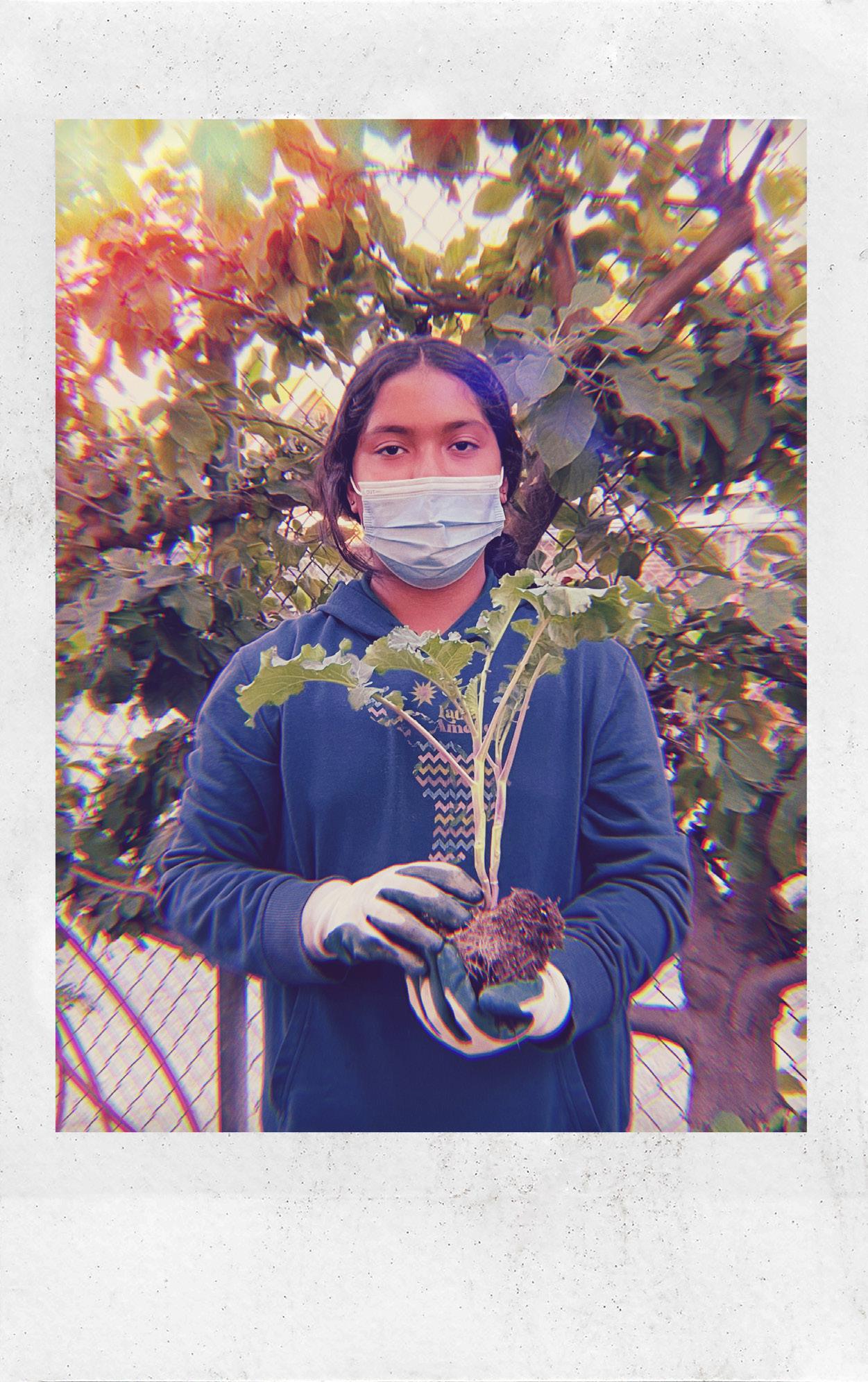
“...they can learn about where their food comes from and start to build that connection”

It was a defining moment for Eskimbirlet Flores when she landed in New York City last Spring to tour New York University. She had an acceptance letter and would be the first in her family to attend college. Understanding the enormity of this decision, A Place Called Home offered to
APCH Shaheen Scholars currently en rolled in college or university 500 students sent to college since 2002
APCH Shaheen Scholars are three times more likely to earn a bachelor’s degree within 6 years than other first generation, low income students
support the cost of a school visit ahead of her decision. Flores and Jennifer Martinez, the APCH Higher Education Manager, spent two days exploring the NYU Campus and city. Flores quickly made her decision, “I felt like I was already home,” she said.

“It was an amazing opportunity for Eskim birlet to check out the campus,” said Marti nez.
Flores grew up in South Los Angeles and remembered the APCH bus traveling past her elementary and middle school. Her mother investigated, found out about their resources and programming, and then signed her up. Flores joined the non-profit the summer before ninth-grade and grav itated toward theater as an extracurricular activity. She also took advantage of tutoring sessions. After some initial hesitation about exploring the higher education/college track, Flores decided that access to better job opportunities in the future was a huge plus.
“The Higher Education Team offers resourc es and opportunities for our high school members, grades nine through twelve,” said Martinez. “We want our members to be college bound and college ready.”

One of the offerings is a College Bound class. The class, taught by assistant man agers from the Higher Education team, work with members on A-G requirements, college match and fit, the four systems of higher education and financial aid. The assistant managers also serve as academic advisors, assisting members with all col lege planning needs. Members learn about credit card debt, interest rates, creating a financial plan and financial goals from Fi nancial Beginnings, a partner organization.
The Higher Ed team also helps contribute to the success of students by managing the application process for the APCH Shaheen Scholarship Program. The David and Linda Shaheen Foundation funds generous fi nancial-need scholarships designed to help pay for, or supplement, the costs of a col lege education for APCH members. “A lot of these students are first-generation, low-in come students, so the scholarship aims to take away that financial barrier for them to pursue higher education,” Martinez said. “This allows them to solely focus on their academics and college life experiences.”
Flores, who enrolled at NYU and is majoring in chemical and biomolecular engineering, was “extremely grateful” for the opportuni ty to visit campus — and for the Shaheen scholarship. While she did receive a “full tuition scholarship” to NYU, the aid filled in those financial gaps, such as the cost of buying books, the expense of lab fees, or sometimes, just getting a piece of pizza off campus. “I’m hoping to save most of my money right now because I heard the win ter is going to come soon,” she said. “And I know those winter coats are going to be a little expensive.”
The Higher Education Team wants to make sure they create even more exposure for their members to learn about the resources available in their program to college-bound members. “We want our members to see that the possibilities for them are endless and there is no such thing as dreaming too big.” Martinez said. -M.Z.
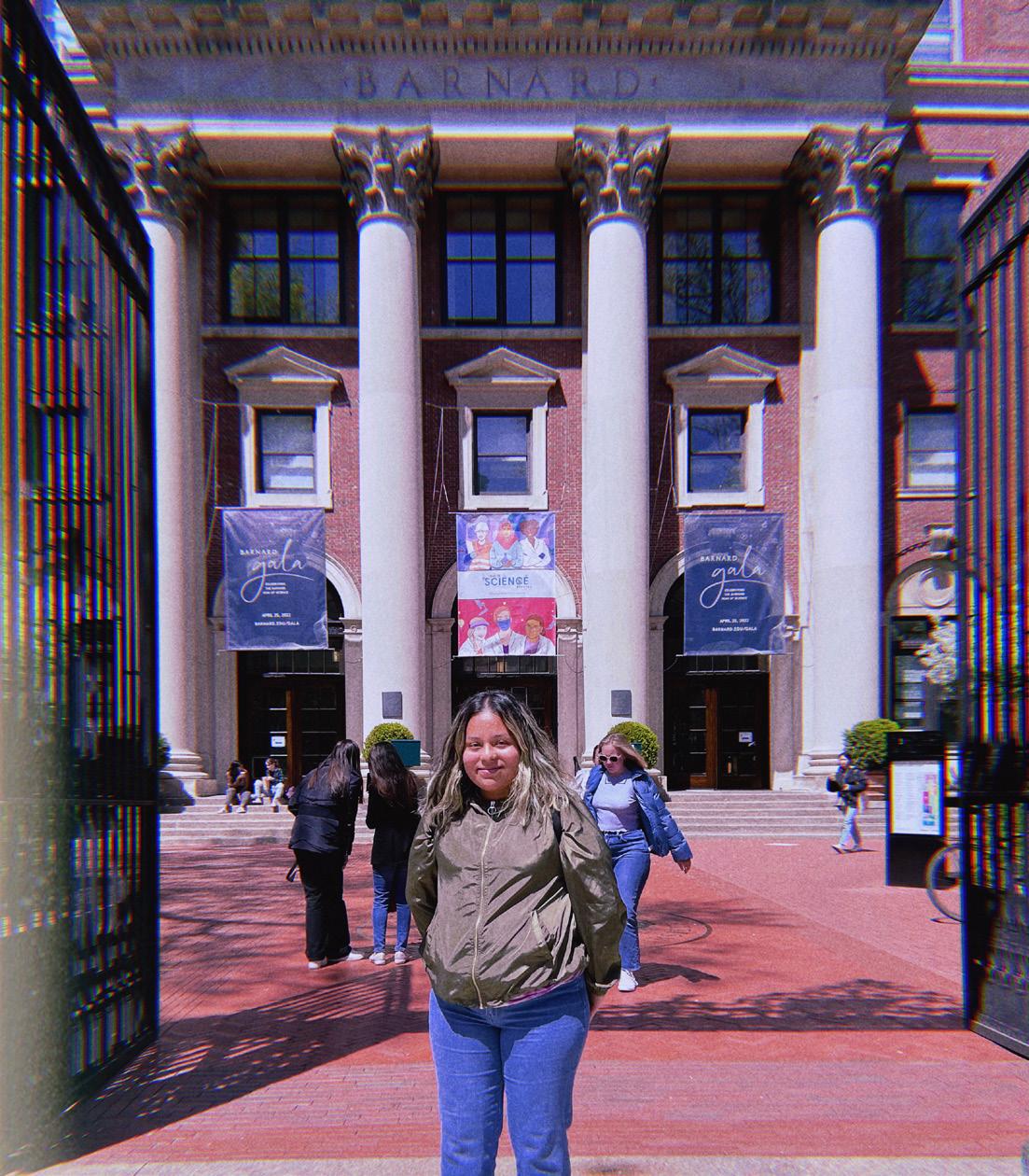


Summertime at A Place Called Home gives older teens a chance to dig deeper into some of their areas of interest and take advantage of both intern and externship opportunities.

Throughout the summer months — across campus — older teens can be found work ing with staff in the Nutrition, Athletics, The ater and Summer Pods programs. These summer associates and high school interns join staff and members— from elementa ry through high school — on weekly field trips to the beach, the mountains and lo cal bowling alleys. They are also on hand during class sessions to assist in delivering lessons on anything from botany to music. “The goal of summer programming is to im merse our South Los Angeles youth in op portunities where they have the chance to explore the world,” said Ufoma, Career Guidance Assistant Manager in the PREP (Professional Read iness and Employ ment Pathways) Pro gram. Ufoma, who ran one of the Sum mer Pod programs for high school students, said, “For our interns it was an amazing op portunity for them to immerse themselves in fun/engaging ac tivities with mem bers while also devel
oping valuable work and life skills. Many of our Summer interns never worked before, so this opportunity provided them with the confidence they needed to seek out other amazing opportunities that come their way.”
This past summer also included an oppor tunity for APCH youth to work in the offic es of DBS Financial Services for six weeks as part of our externship program. “They had a great introduction to the world of financial services, and it really broadened their ideas and understanding about banking and fi nance careers,” said Morgan Kim, Associate Director of Teen and Young Adult Services.
During the six-week program, members learned about portfolio management,
the credit rating system, project man agement, global operations and oth er aspects of investment bank ing. “All four externs received return offer letters for summer 2023,” Kim added.

When school is back in session, high school members enrolled in PREP are engaged in classes on career readiness and job develop ment. In one of the classes, “Getting PRE Pared,” an Employment 101 course taught once-a-week, students learn about resume writing, time management, how to craft cov er letters and develop the soft skills they will need going into the work world. Through out the month of November, a volunteer will teach financial literacy tips, showing youth how to build credit, invest and budget.
In the coming year, the PREP program also plans to create more entrepreneur ial opportunities for students to follow their career path passions. There is also a young adult program scheduled to start in the Spring. Here they will offer ca reer readiness and job training classes for young adult members 18 to 22 years old.
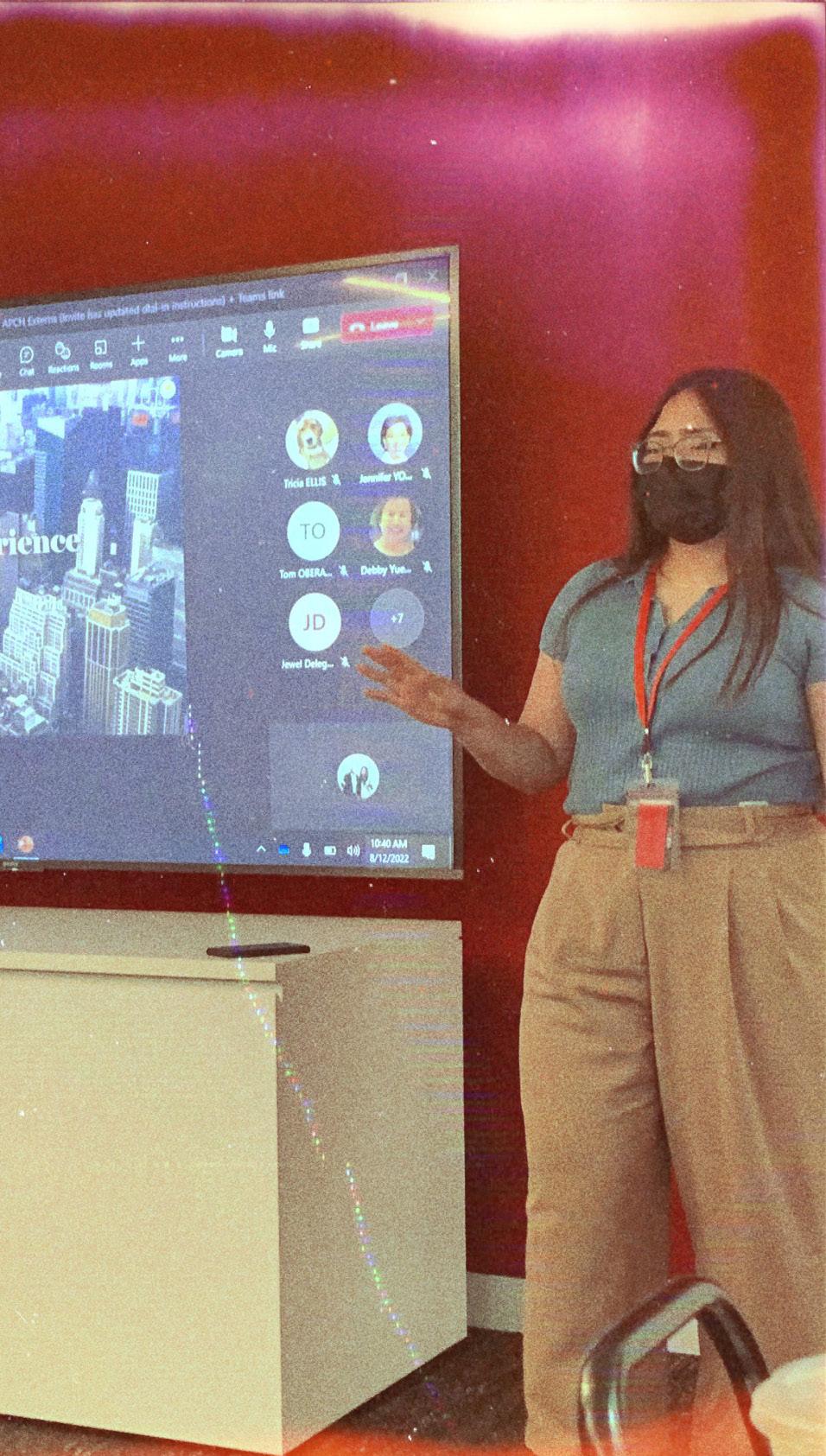
“It’s about youth development, leadership, and creating opportunities and resources for young people to develop into contribut ing members of society,” Kim said. “So, if they want to be successful in college, we work with the Higher Ed services program to make sure they are doing well academically. If they want to be an electrician or a baker, we sup port them to get externships for any of those careers. For me, it’s about elevating young people to the next stage in their life with the support needed. And you can’t do that unless
you have guidance, unless you have mentoring, unless you have resources, but most importantly, unless you have some body helping you navigate the system.” -M.Z.
“For me, it’s about elevating young people to the next stage in their life with the supportneeded.”
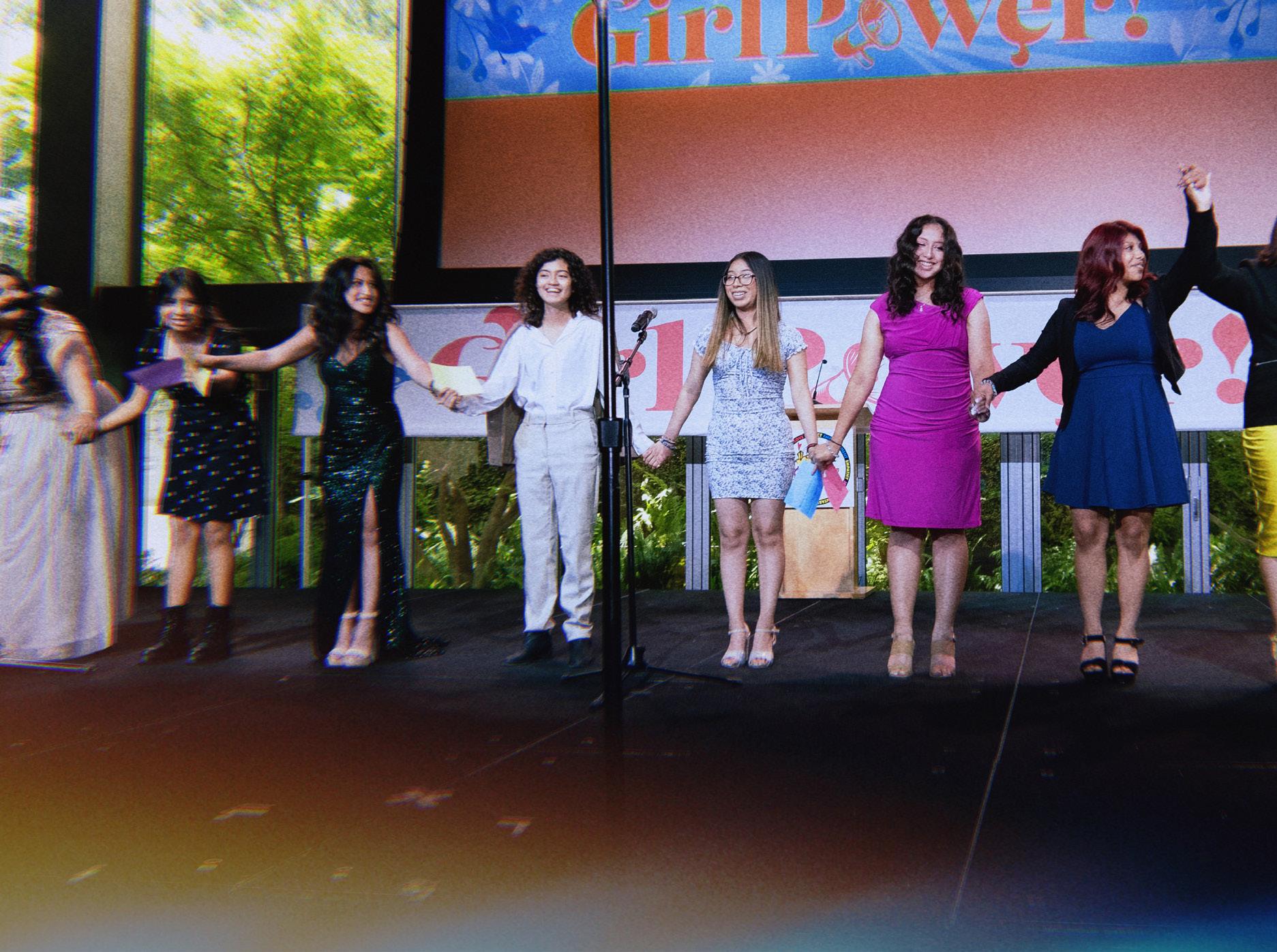
Sitting in a circle surrounded by her peers provides Luz the chance to share her feel ings about her upcoming graduation in June 2023 and plans for a future post high school. The space is part of the weekly group mentoring sessions offered by the Mentoring Team at A Place Called Home.
Mentoring at APCH started in 2013 with a community-based volunteer program called LIFE (Lead, Influence, Foster and Empower). “These are individuals in the community who want to give back through mentoring by sharing their skills, stories or experienc es — their time most of all — to support young people as they transition from high school to planning for their future,” said Katherine Monterroso, Mentoring Manager.
The one-to-one mentoring program has been a huge success and APCH has made more than 100 matches in the ten years it has been running. The group mentoring program began in 2015 and is available for both middle and high school students at the beginning of the school year. Members are placed in cohorts based on their gender identification and age group for ten months
of learning and personal development.
“It’s a very powerful group space we of fer for our young members,” Monterro so said. “Even though the groups do not meet weekly together they all share the same curriculum and core values. If wom en are learning about consent, how to say ‘no’ and set healthy boundaries, our young men are learning about consent, as well.”
The one-and-a-half hour classes focus on identity development, leadership devel opment, relationship building, communi ty engagement or service, and community building (i.e. brotherhood/sisterhood). There is a sense of ownership in these discus sions for members, as program leaders in corporate their feedback and bring issues and concerns back into future meetings.

Luz is part of the High School GirlPow er group and admits to learning strong communication skills during her time at APCH. “I was actually a very shy person when I came here,” she shares. “I didn’t like talking to new people or making new friends. For me, GirlPower was a commu nity we created to feel safe and empow ered with other girls. It’s an environment where we can be open and more mindful.”
Members also interact with other teams at APCH. The high school students, spe cifically, work with the PREP Team on re sume building and career readiness and attend workshops with the Higher Edu cation Team to learn more about college pathways and scholarship opportunities.
As part of this collaboration, on Oct. 5, 27 members from the Higher Educa tion and the Mentoring Team traveled to University of California, Santa Barba ra for the day to tour the campus and learn more about the resources and op portunities available for a college student.
Edwin, who is part of the high school Jour ney group, had been considering taking a year off after high school, but was in trigued by the aquatic biology program he learned about at UCSB. “The idea that they have a department to study things like sea creatures and what is at the bottom of
the sea is very interesting to me,” he said.
After the tour, Edwin decided he might not take a year break, and instead plans to apply to UCSB and other colleges for the next academic year. “I think it’s import ant for them to be in a space with other peers, so they can see themselves reflect ed back,” Monterroso said. “They can see they are not experiencing things on their own, they’re not navigating changes in their life by themselves. Others have gone through similar things, similar journeys.”
At the end of each session, when every one is gathered around in their respec tive circles, sessions close by everyone dis cussing a take away from something they learned that day — or words of appreci ation and gratitude from session leaders aimed at getting youth through the week, until they all meet again next week. -M.Z.

After a few encounters with the juvenile jus tice system, a police officer recommended to David, then 15-years-old, that he talk to his mother about A Place Called Home. “I wasn’t thinking about my decisions or the consequences of what I was doing in my life,” David said. While hesitant at first af ter joining, David soon realized this wasn’t
going to be a program he wanted to “get over with.” He shared his dream of going to college and coming back to APCH one day to let them know he was, “doing good.”
David was born in Honduras and moved to the States when he was 9. When he joined APCH, he also enrolled in Da Vinci RISE
“For me, GirlPower was a community we created to feel safe and withempowered other girls.”
High School, a pro gressive school that operates on the campus of APCH.


“The high school has an official partnership with APCH,” said Marsha Young, Senior Program Manager of IMPACT. “They share our campus, and we provide membership services for all of their students.” Students at RISE not only join the IMPACT program but are directed to the other resources at APCH, including teen and young adult programs such as: PREP, where members can plan a technical or vocational track or Higher Education, for members considering a two-or-four-year college experience.
“The mission of the IMPACT program is to serve youth from 14-22 who are dealing with societal barriers,” Young said. “We provide a whole child approach by offering program ming that focuses on youth who are un housed or who have connections with foster care or the juvenile justice systems. The ulti mate goal is to find ways to meet their needs so they can have success when they exit.”
A typical day in the IMPACT program starts at 5:00 in the evening and includes activi ties such as improvisation, visual art class es, life skills and self-care workshops, dis cussions about financial literacy, as well as careers members can consider after high school. A key part of the program, though, is teaching better communication skills.
“I never thought I would be able to commu nicate about myself as much as I did these past few years,” David said. “I don’t talk about myself, and I don’t open up to peo ple like I have been able to since I came to A Place Called Home. And that’s the num
ber one thing they helped me to do. Open up, you know, and not be afraid to talk.”
Olivia Dickerson, the IMPACT Coordinator, shares how the IMPACT team works direct ly with RISE members, such as David, to help them get credit towards their diplo ma. “Since RISE is an independent studies school, that’s huge for the students,” she said. “To be able to offer that extra, ‘Hey, if you come to four of these classes at APCH and do a write up on what you learned, you get two credits,’ is really cool. It’s help ing them get credit toward their diploma.”
As David begins applying to colleges, he re flects on his three years at APCH. “They push you to be better,” he said. “They see a worth in you that you can’t always see in yourself. It’s not just a program, it’s not just, ‘Oh, you got to come and do this or do that.’ They allow you to make your own choices, and they allow you to see a better choice. To know that you de serve to be what you were meant to be.” -.M.Z.
“They see a worth in you that you can’t always see in yourself.”



On the second Thursday of each month at 4:30 p.m. on the dot, parents are greet ed by APCH Counseling Department staff members as they log in to Parent Cafe – a monthly Zoom gathering for them to con nect with both APCH staff and each oth er. Sessions often revolve around a specif ic topic based on parents’ input, including financial literacy, supporting a child who identifies as LGBTQIA+, and how to handle a soon-to-be college student leaving the nest.
“We want this to be a safe haven for par ents,” shared Jose Manuel Soria, Sr. Man ager, Case Management. “It’s a space for them to vocalize their needs, to ask ques tions and receive support from both the Counseling department and other par ents who have had similar experiences.”
Aside from hosting Parent Cafe, the APCH multidisciplinary Counseling team is a cru cial part of the organization. They provide individual and family therapy, case manage ment, and behavioral support, and coordi nate direct assistance in the form of shoes, backpacks, household appliances, weekly grocery deliveries, rent assistance, and oth er necessities. The team collaborates with each department at APCH to make sure ev
“Our goal is to empower our members and families to build fulfilling futures, and we want to use the resources we have to increase access to mental health support and to re duce the stigma around counseling,” said Dr. Maria Austin, Sr. Director of Counseling My daughter recently went through a period of deep depression, and thanks to the Coun seling team at A Place Called Home, she has made a big change,” shared Leticia, an APCH parent. “Now, she’s doing well in school and it’s like she’s a completely different per son. I am very grateful to APCH for that.”
An integral part of APCH’s holistic approach is ensuring that member families are sup ported, too, and — in addition to the Par ent Cafe — the Counseling Department strives to meet parents where they are through individualized counseling to help them build healthy relationships, devel op healthy coping mechanisms, and most of all provide them a place of belonging.
“The parents at APCH are really amazing,” said Dr. Austin. “They are involved and invested in their children’s lives, and their engagement really makes a difference in our work. Ulti mately, mental health impacts everything –physical health, relationships, life satisfaction – so the fact that we can support not only our members, but our parents, too, has a huge positive impact for the entire family.” -M.S.
APCH has provided nearly 1,000 hours of counseling services this year.
ery member and family has the tools and the support they need to be successful.
Children from families living in poverty are three times more likely, on average, to suffer from psychiatric conditions.Source: Children’s mental health: Is poverty the diagnosis?

One Saturday in mid-October Gary Nellis was set up in the library of A Place Called Home, taking photographs of 36 families for a “Family-to-Family” project he was cre ating for the organization. While he has taken photos at many events throughout the three and a half years he has been vol unteering here, it is these personal por traits that connect him on a deeper level.
“When you’re in the moment and photo graphing families in five-minute intervals, you’re more concerned with posing, put ting them at ease,” Nellis said. “But when I’m home, looking through the 1600 or so pictures I took, that’s when I can see how the families interacted with each other — the sense of the love between them. That’s really powerful.”

This passion for photography fol lowed Gary Nellis from childhood to to day and enables him to take advan tage of his creative skill set to give back.
Whether he is taking portraits of families, the vertical gardens being installed on the APCH campus, a Girl Power event, or mid-air shots of hundreds of donated holiday gifts being handed off the back of a truck into the waiting arms of staff, they all tell the story of the hard work, dedication and care that can be found throughout the APCH community.
Nellis’ path to APCH might not seem straightforward, but it was fortuitous. He was born in New Jersey and moved to Los Ange les soon after. By 11, he could often be found spending time after school wandering the streets of Hollywood with friends. His moth er, raising him alone, tried to enroll him in
a Boy’s Club, but he’d immediately exit the clubhouse when she’d drive away. It was a growing interest in photography, initially to tell a story cinematically, that provided him with a purpose as well as a lifelong passion.
After graduation from Fairfax High School, Nellis and a girlfriend traveled over land from London to Nepal and back again. “It was a year-long photographic journey,” he said. He then spent several years living and working in New York, before moving back to Los Angeles. In the early 2010s he met former APCH Executive Director Jonathan Zeichner, and toured the facility. Nellis was instantly hooked.
“The kids were being dropped off from school in various buses and they just poured into this facility,” he said. “They went to their respective classrooms, some heading to the dance rooms, others to photography or film or theater. It was just this whirlwind of creativity, and I instantly connected.”
Another connection that same day sealed his fate on a more emotional level. “I met this kid who could have been me if I had stayed at that Boys Club,” he said. “It was ob vious that members were being nurtured here. I didn’t want to walk out this door.”
Nellis found the perfect way to give back. “One day I called and asked if they need ed a photographer,” Nellis said. “The an swer was ‘yes.’ My photography – my photographs – are a gift that I can give.”
Nellis’ work was most recently exhibited for three months at the onodream Gallery. -M.Z.
Whatdrewyoutononprofitwork?
I’ve been in the nonprofit sector for over 20 years, and what drew me to the work was really the people. Through this work, I found an incredible group of people coming together to do right by the communities they serve. I found people with heart, passion, and dedication that were really trying to make a difference in the world, and that was so inspiring. It felt like I had found my people, and that’s what resonated with me most and why I fell in love with this work. For me, it’s that con nection and collaboration, that common purpose of supporting communities that have greater needs, that really moves me. We always say “Welcome to the fami ly” and as I got into the work, I really felt that the whole nonprofit community is a family, that this is where my heart is and this is what I wanted to dedicate my life to.
Whatisamomentinyourcareerthatyou’remostproudof?

For me, it’s not so much about my own individual moments, but about the col lective moments I have with others that move the work forward. This might be different than how most people see the role of a CEO, but a lot of the work I do is behind the scenes. It’s creating an environment for people to feel safe, supported, and cared for. I think sometimes we take the heart out of the work and we try to be very transactional, but for me it’s important that people feel a sense of connection on a personal level. Our work is personal. Super personal. I feel really proud when I can create teams that feel that sense of “we’ve got each others’ backs”, and that they can count on me if they’re feeling challenged. When I can create an environ ment where people feel empowered by their work and they can go out and help others be successful, that’s when I’m most proud.
Whatwouldbeonyouritineraryforaperfectweekendoutandaboutin LA?
I love being in LA, you can do so many amazing things. My perfect weekend defi nitely includes sleeping in (just a little bit) in the morning and having a nice cup of coffee, then heading out for a nice meal and some refreshing cocktails in the afternoon. My partner loves going to a museum or catching a show, so we’d prob
We asked Norayma three questions to learn a little more about her. Enjoy!
ably do that. I love music, so if there’s a concert, that’s even better. I also love the Dodgers, so if there’s a game, I’m there! I’d also stop by and visit my parents and spend some quality time with them. My mother is an amazing cook so she’ll prob ably feed us again even though we’ve just eaten. Then I’d come home to spend some time with my 3 kiddos and cook them their favorite meal–chicken taquitos with warm green salsa. We’d finish off the day with some board games and call it a night. If I can get some good food, time with my parents, my children, and my partner, that’s a perfect weekend.
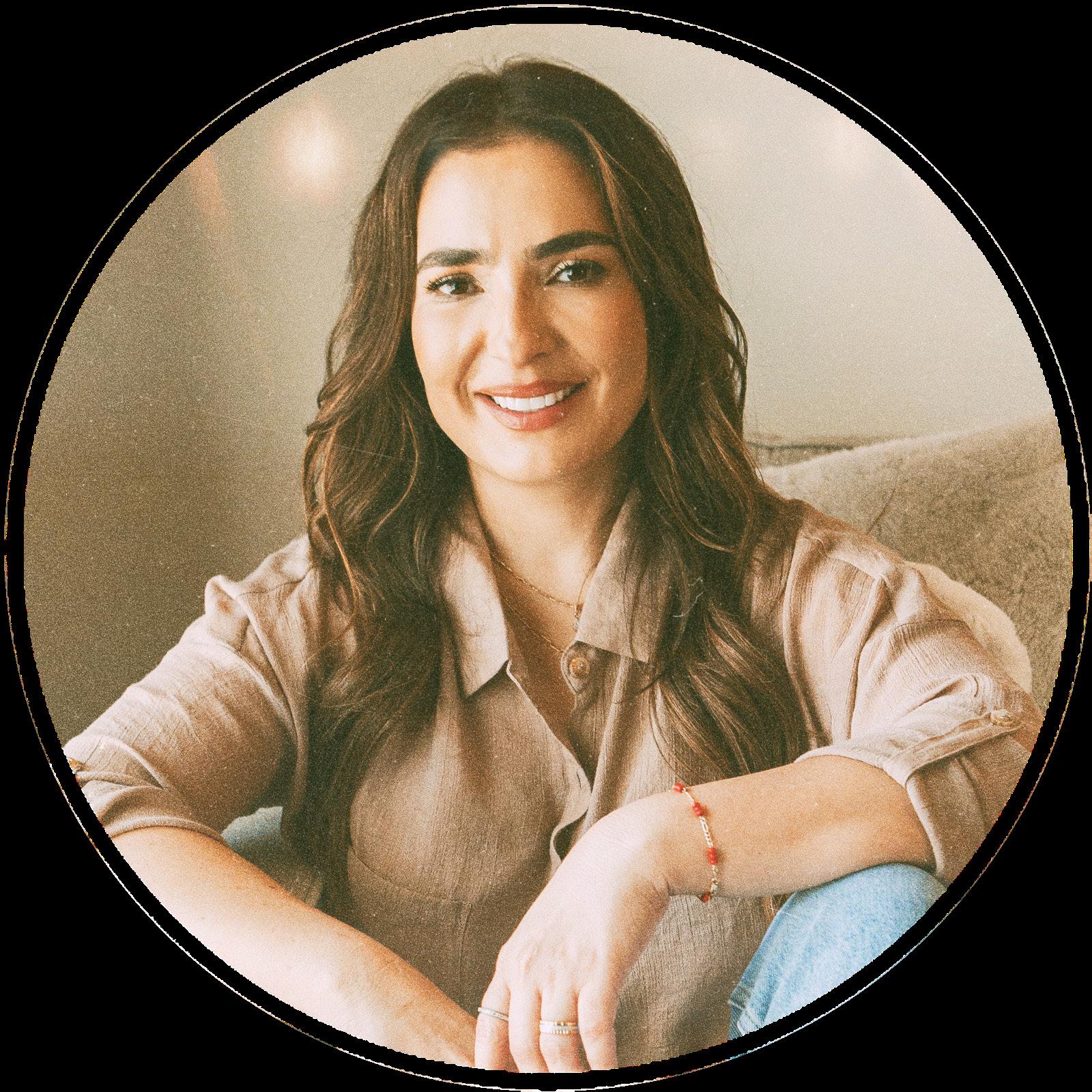

It is my great pleasure to welcome Edgar Mo rales, an APCH alumni, to our Board of Direc tors. Edgar is the second alumni member to join the board, and was a member of the or ganization for 7 years, starting at age 16.

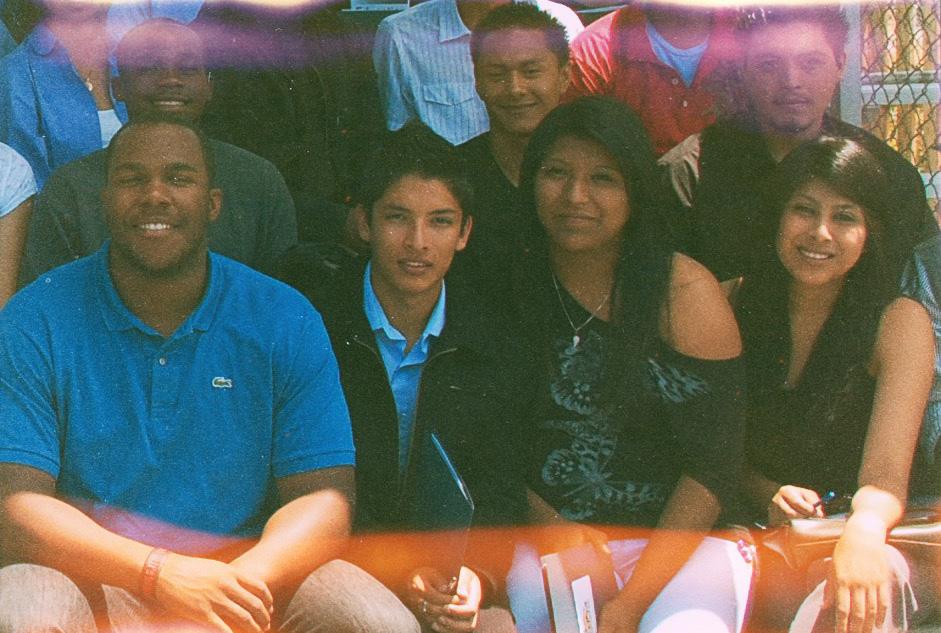
Today, Edgar is a civil engineer working to safeguard water resources for the City of Los Angeles, and we are thrilled to have his ex pertise and insights as APCH heads into our 30th year of service to South Central.


Last year, we were delighted to welcome another APCH alumni, Ethan Smith, to the board, and it is such a joy to witness another full circle moment for APCH. It is only with your support that this is all possible. Thank you. Together we are creating a better future for Los Angeles.
- Gareth Schweitzer, Board Chair

Gareth Schweitzer Board Chair
Barbara Glazer Vice Chair
Susan Napier Vice Chair
Hamed Tavajohi

Treasurer
Maryellen Zarakas
Secretary
Dawn Campbell
Sister Patricia Connor, RSHM
Michael Converse

Louise Hamagami
Sharon Hauptman
Bob Israel
Jacqueline Jimenez
Michelle Raimo Kouyate
Tom McCabe
Edgar Morales (Alum)
Melissa Palazzo-Hart
Kathryn Price Converse
Howard Sherwood
Stephanie Sherwood
Ethan Smith (Alum)
Vera Stewart
Marshall Wax
Susan Wolf
Adam Rosenblatt

Chair

Chad Bates
Chris Ceccotti
Emily Hopton
Josh Russak
Maya Shah-Ceccotti
Hayley Wood
Lily Yeatman
The







2830

Legacy Society
Want to help change the world? Join the club!
For a minimum annual or monthly donation, you can help support APCH’s work serving South Central youth and families, AND get access to exciting, exclusive benefits!
As an SCC member, your benefits include: An exclusive Social Change Club enamel pin Quarterly networking opportunities with industry experts Discounted access to APCH events Priority hands-on volunteer opportunities Invitation to the private Social Change Club LinkedIn group

Leave a legacy for the future of Los Angeles.
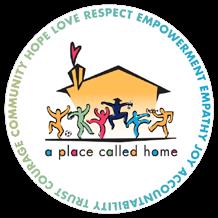
Thank you for investing in the young people of South Central Los Angeles. We would like to invite you to join our 2830 Legacy Society, honoring those whose estate plans include A Place Called Home.
We are deeply grateful for the generous support of longtime friends of APCH who have entrusted us with carrying on their legacy through our work.
If you would like to learn more and discuss options for your philanthropic legacy, please visit: https://apch. org/2830-society
A Place Called Home provides a safe, nurturing environment with proven programs in arts, education and wellness for the young people in South Central Los Angeles to help them improve their economic conditions and develop healthy, fulfilling and purposeful lives.

